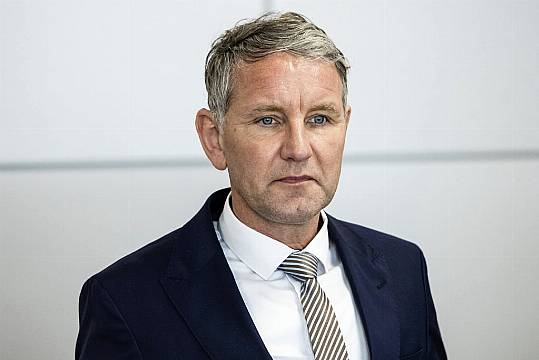A court is expected to deliver its verdict in the trial of one of the best-known figures in the far-right Alternative for Germany party, who is accused of knowingly using a Nazi slogan in a speech.
Bjorn Hocke went on trial at the state court in the eastern city of Halle in mid-April, months before an election in the state of Thuringia in which he plans to run for governor.
He is accused of using symbols of unconstitutional organisations, a charge that can carry a fine or a prison sentence of up to three years.

Hocke is accused of ending a speech in nearby Merseburg in May 2021 with the words “Everything for Germany!”.
Prosecutors contend he was aware of the origin of the phrase as a slogan of the Nazis’ SA stormtroopers, but Hocke has argued that it is an “everyday saying.”
The former history teacher told the trial that he is “completely innocent” and described himself as a “law-abiding citizen”.
The 52-year-old Hocke is an influential figure on the hard right of Alternative for Germany, or AfD.
He has led the AfD’s regional branch in Thuringia since 2013, the year the party was founded, and is due to lead its campaign in a state election set for September 1st.
He once called the Holocaust memorial in Berlin a “monument of shame” and called for Germany to perform a “180-degree turn” in how it remembers its past.

A party tribunal in 2018 rejected a bid to have him expelled.
A conviction wouldn’t necessarily have any direct effect on Hocke’s political ambitions.
Courts can in principle decide to bar a person who has been sentenced to at least six months in prison from voting or being elected for a time, but that is not automatic and the court has already indicated that a prison sentence is unlikely.
AfD is particularly strong in Germany’s formerly communist east, where Thuringia is located.
It’s unlikely that any other party will agree to work with Hocke and put him in the governor’s office, but AfD’s strength has made forming governing coalitions in the region very complicated.
The Thuringia branch of AfD is one of three that the domestic intelligence agency has under official surveillance as a “proven right-wing extremist” group.
On Monday, a court ruled in a separate case that the agency was justified in putting the whole party under observation for suspected extremism.
AfD has portrayed the designation as a political attempt to discredit the party and said it will seek to appeal.







